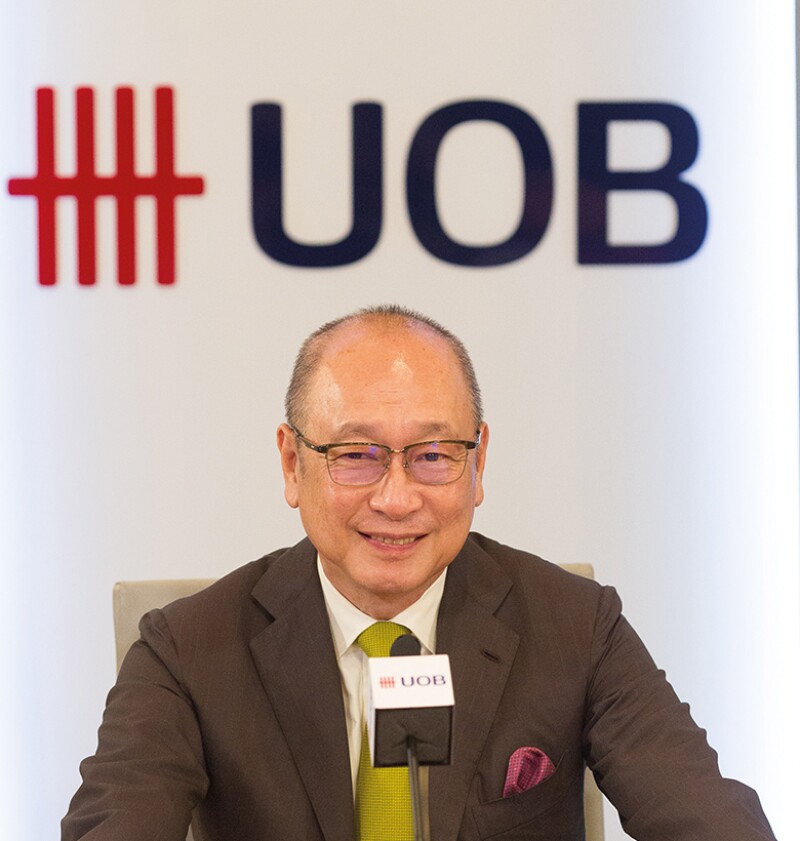
Wee Ee Cheong, UOB: demands “honour, enterprise, unity and commitment”
 |
| ASIAMONEY 30 |
Wee Ee Cheong, CEO of United Overseas Bank, puts values at the top of his agenda.
The word crops up directly, as when he outlines the need to do “what is right for our customers and colleagues, guided by our values”. He espouses the importance of upholding “the highest standards of ethics and integrity”, and of tapping young talent that lives by the tenets of “honour, enterprise, unity and commitment”.
Strong balance sheets, fiscal prudence, rigorous corporate governance, adherence to the needs of customers and clients, and an almost Victorian sense of fair play: it’s all there in a bank founded long before the state of Singapore even existed.
When Wee mentions the global financial crisis, he points to the importance of cutting costs instead of people, and remaining "steadfast in support of [the bank's] customers". In doing so, UOB was able, he adds, "to help our customers ride out the difficult period and take advantage of the opportunities that followed”.
Long-term focus
Knowing the past, taking care of the present and planning for the future: it’s what UOB does well. Not that this is an institution frozen in time, like a fly in amber. From the 1970s, the bank grew steadily, expanding beyond Singapore as the Asean region discovered coherence and connectivity. Its S$10 billion ($7.2 billion) merger with OUB in 2001 cemented its status as one of Singapore’s big three lenders.
It has fully owned banking operations in China, Indonesia, Malaysia and Thailand, and branches in 14 Asian countries, including Myanmar and India.
Its long-term focus on trade, vital to its ability to serve a large roster of small and medium-sized enterprises (smaller firms being the bedrock on which UOB was built) led it to sign partnerships with, among others, Vietnam’s Foreign Investment Agency, Enterprise Singapore and China’s Council for the Promotion of International Trade.
Knowing the past, taking care of the present and planning for the future: it’s what UOB does well
Identifying UOB’s future strategy doesn’t require much reading between the lines. At a corporate level, the bank is tapping cross-border trade flows in areas such as consumer goods and construction, to offer clients world-class cash, trade and treasury services.
It will continue to expand its regional presence, but with a higher commitment to southeast Asia.
Asean, notes Wee, is “poised to be the fourth-largest economic bloc by 2030 after the US, China and the EU. The region’s foreign direct investment inflows are expected to more than double by 2030, [and] our regional network will help our customers seize regional trade opportunities.”
There’s a potential double play at work here. Production is shifting to southeast Asia as salaries and working costs rise in China. The sovereigns set to benefit most are Vietnam and Indonesia, with their large and growing consumption-oriented populations, and Singapore, the region’s financial and commercial hub. UOB, of course, is present in all three.
Shift to digital
Perhaps the biggest recent changes at UOB involve its belated but effusive embrace of technology and transparency. A bank that rarely courted publicity now hosts members of the Fourth Estate – as this interviewer can attest – and holds open days for journalists and analysts.
But the rapidity of its shift to digital is a far bigger story. Over the last 18 months, UOB has launched a joint venture with Chinese digital lending platform Pintec, a specialist in AI and machine learning, and unveiled a host of alliances with the likes of ride-sharing giant Grab, e-commerce platform Qoo10, and OctoRocket, a business-to-business platform that links buyers and suppliers across southeast Asia.
Then there is its new digital bank, unveiled in August 2018.
With its shocking candy-coloured design and snappy marketing, TMRW, as it’s called, is expressly designed to look less like a bank than a funky startup, making liberal use of exclamation marks and words like ‘awesome’.
It is hard to equate TMRW (now up-and-running in Thailand and set to be rolled out in five Asean markets) with the parent’s well-worn brand as a solid, dependable, conservative lending institution, yet that’s the path UOB has chosen to take. So long as it works, retaining UOB’s corporate strength while attracting young, savvy customers makes good sense.
Taking the sensible approach of holding your enemy close, Wee and his team chose to embrace fintech, adopting, he says, an “open rather than a closed-loop approach to building our regional business”.
TMRW, he notes, was the result of its “collaboration with several fintech firms”, a process that resulted in the bank knowing far more about its customers.
For employees who have been with UOB for decades in many cases, this radical departure from the bank’s historical norms, at least on the retail side, must be either giddy and exciting or wrenching and bewildering.
For those in the latter camp, it will be with a sense of relief that the chief executive, the third generation of his family to man the shop, talks so forcefully about honour and values, and of ethics and integrity.